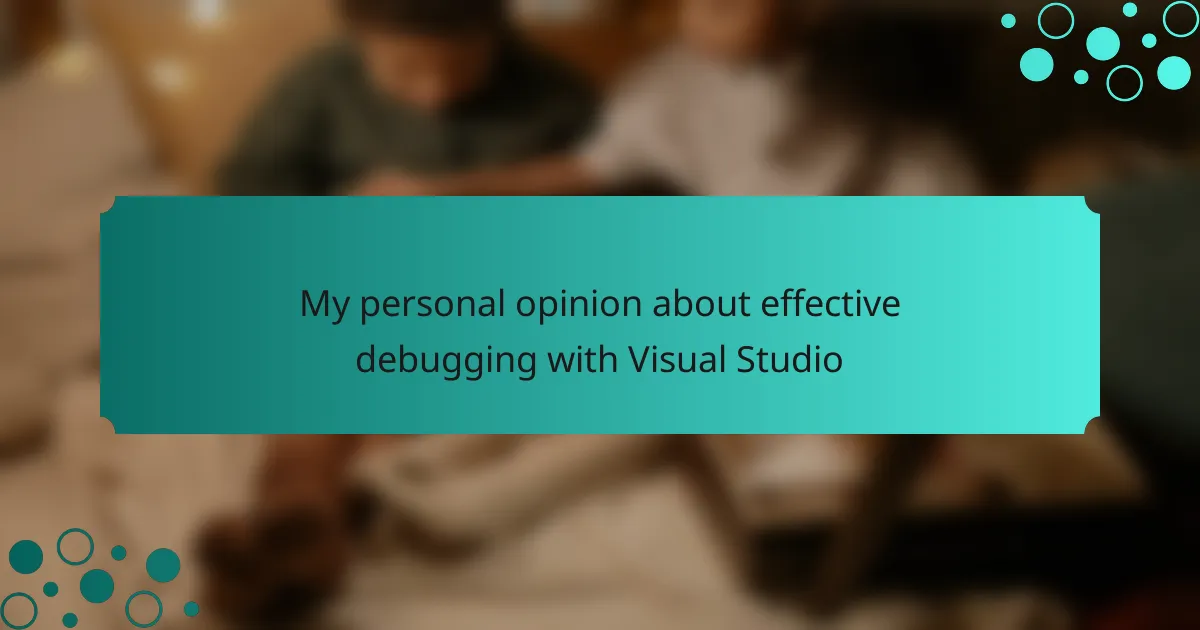Key takeaways
- Effective debugging is crucial for understanding code, saving time, and boosting confidence in programming skills.
- Visual Studio offers robust debugging tools, including breakpoints, watch windows, and IntelliSense, enhancing the coding experience.
- Techniques such as stepping through code and maintaining a debugging diary can significantly improve troubleshooting skills.
- Beginner tips for Visual Studio include familiarizing with breakpoints, using the watch window, and experimenting with debug configurations.
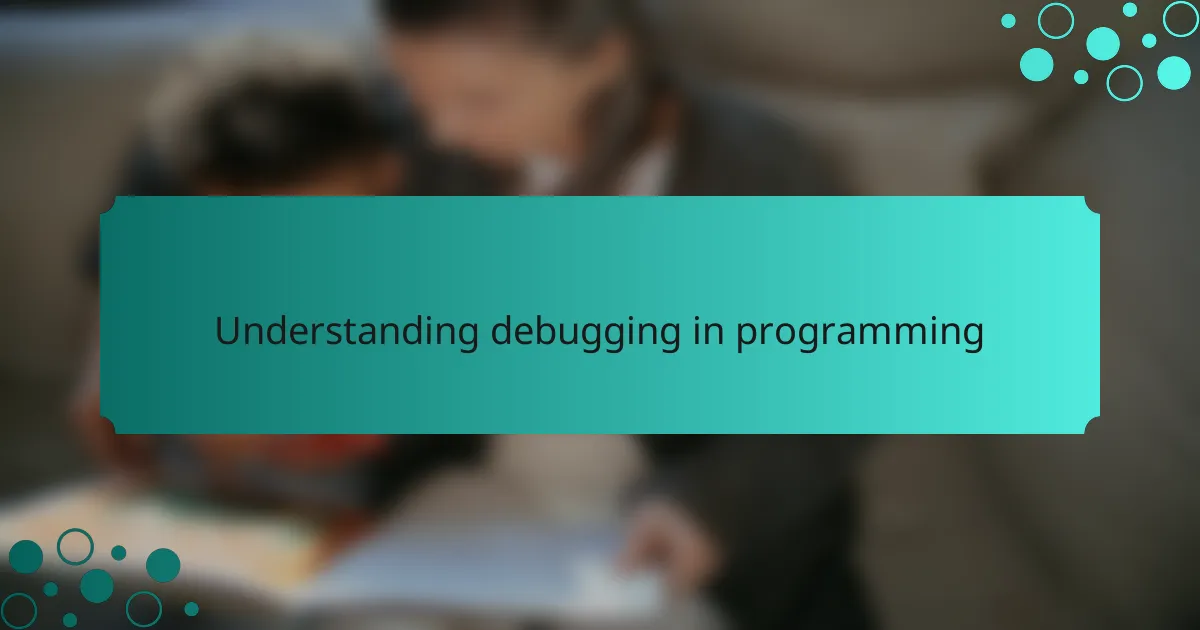
Understanding debugging in programming
Debugging is an essential part of the programming process. I remember when I first started coding; I often felt overwhelmed by the sheer number of errors, unsure of where to begin. Over time, I learned that debugging isn’t just about fixing bugs—it’s about understanding the flow of your program and identifying where things go awry.
Here are some key aspects of debugging that can enhance your programming experience:
- Identify and Understand the Problem: Take the time to comprehend the error messages; they often provide valuable clues.
- Use Breakpoints: Set breakpoints to pause execution and inspect variable states. This has saved me countless hours of guesswork.
- Step Through Code: Instead of reading lines of code, step through them line by line. This approach helps me visualize the program’s behavior.
- Check Input Values: Often, the issues stem from unexpected input. Logging input values can clarify where the problem lies.
- Keep a Debugging Diary: Jotting down what you learn from each debugging session not only tracks progress but also builds troubleshooting wisdom over time.
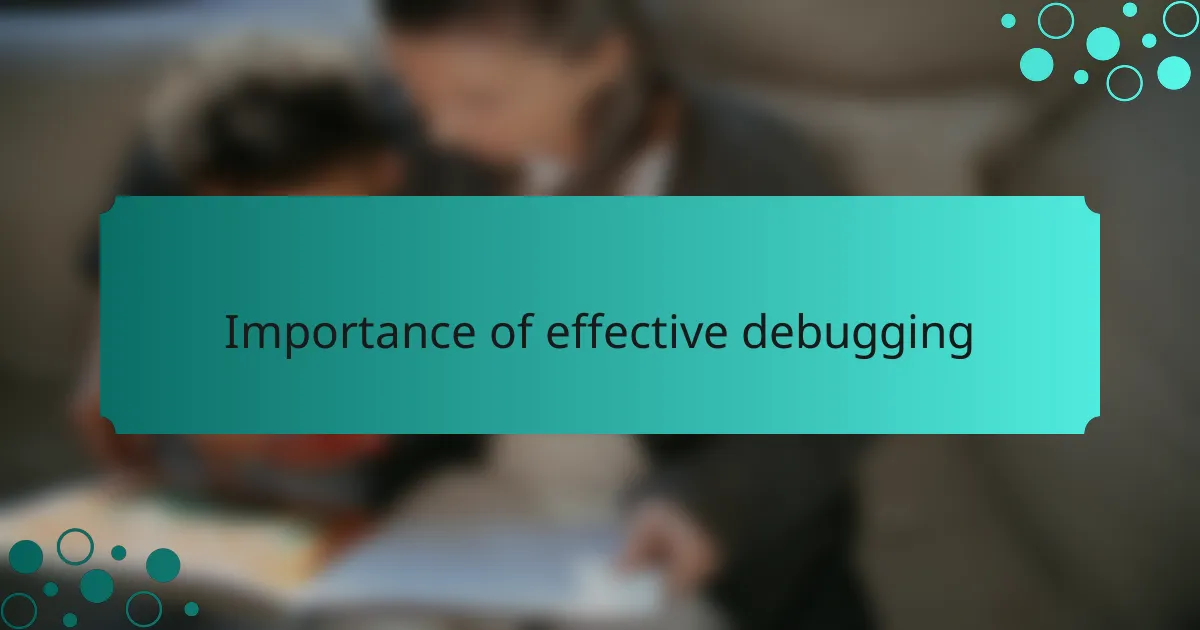
Importance of effective debugging
Effective debugging is crucial for any programmer, especially when working with complex code. I remember when I first started coding; I spent hours tracking down a pesky bug that turned out to be just a misplaced semicolon. This experience taught me that effective debugging not only saves time but also reduces frustration.
The importance of debugging extends beyond fixing errors. It enhances understanding of the code and boosts confidence in my programming abilities. When I successfully resolve an issue, I feel an incredible sense of accomplishment, reminding me that debugging is an essential skill in any developer’s toolkit.
Here’s a simple comparison of the cost and benefits of effective debugging:
| Aspect | Effective Debugging | Ineffective Debugging |
|---|---|---|
| Time Spent | Less time, targeted approaches | More time, guesswork involved |
| Learning Opportunity | Increases understanding, skill-building | Limited learning, repeated mistakes |
| Emotional Impact | Boosts morale and confidence | Frustration and discouragement |
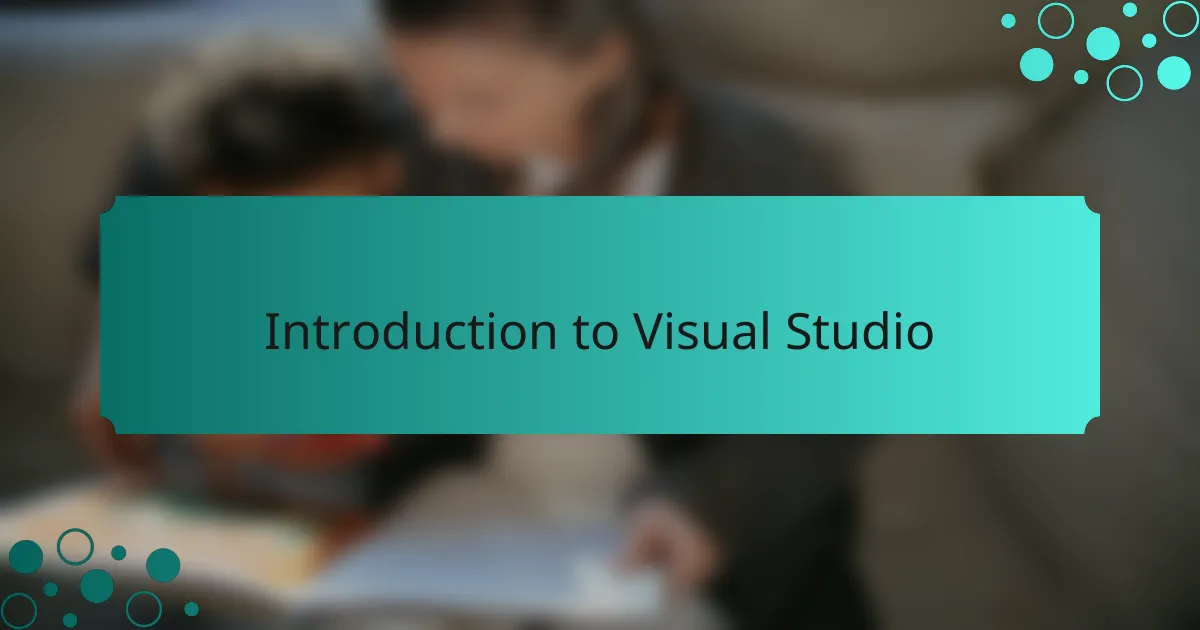
Introduction to Visual Studio
Visual Studio is a powerful integrated development environment (IDE) that many developers, myself included, turn to for its robust features. I distinctly remember feeling intimidated by its vast capabilities when I first explored it. However, once I navigated its interface, I found a wealth of tools designed to simplify and enhance my coding experience.
One of the standout features of Visual Studio is its debugging suite. I have often relied on its seamless integration of breakpoints and watch windows to analyze code execution in real time. This has made troubleshooting an engaging journey rather than a frustrating ordeal, as I could pinpoint issues quickly and effectively.
Moreover, Visual Studio supports various programming languages and frameworks, which makes it a versatile choice for developers at any level. I appreciate this flexibility because it allows me to switch between projects without the hassle of learning new tools each time. This adaptability is crucial in today’s fast-paced development environment, where efficiency can make a significant difference.
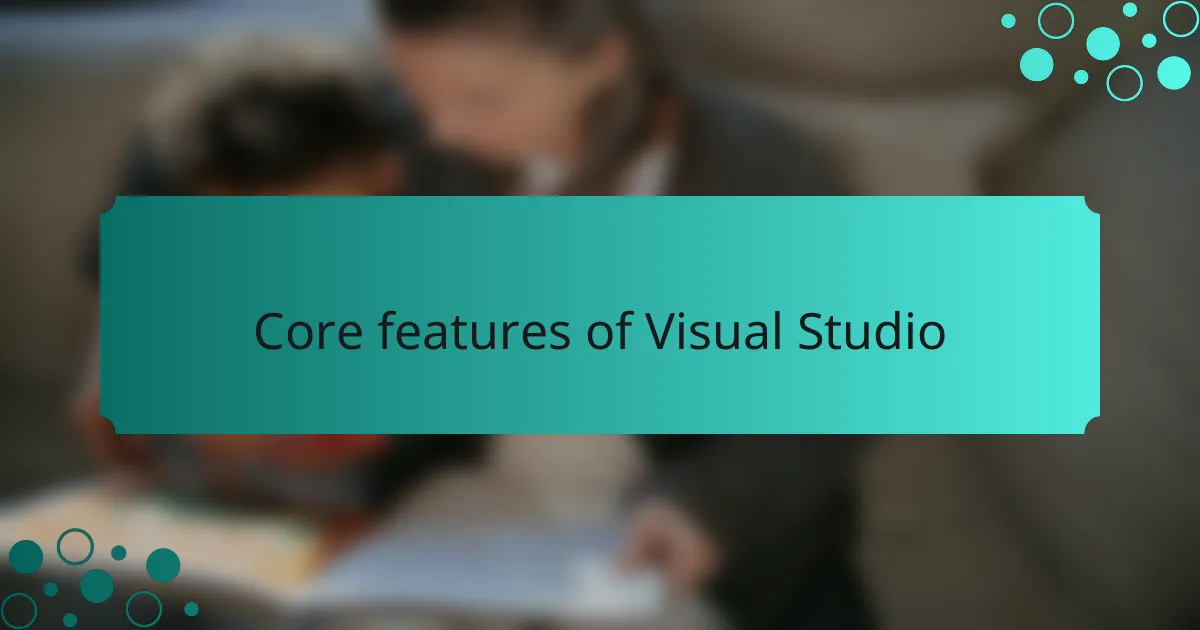
Core features of Visual Studio
Visual Studio is packed with powerful features that can significantly enhance the debugging experience. One of my favorites is the IntelliSense feature, which not only offers code suggestions but also provides real-time parameter info. I can’t tell you how many times this has saved me from struggling to remember function signatures during my coding sessions.
Another standout feature is the integrated debugging tools, allowing you to set breakpoints, inspect variables, and step through code effortlessly. I remember the first time I used it; it felt like having a personal guide as I navigated through complex code, uncovering bugs with ease.
Lastly, the collaboration tools, such as Live Share, enable real-time code sharing and debugging with colleagues, which has been a game changer in my team projects. Nothing beats the feeling of problem-solving together, and Visual Studio makes that possible.
| Feature | Description |
|---|---|
| IntelliSense | Provides code suggestions and parameter info in real-time. |
| Integrated Debugging Tools | Set breakpoints, inspect variables, and step through code. |
| Live Share | Collaborate in real-time while coding and debugging with peers. |
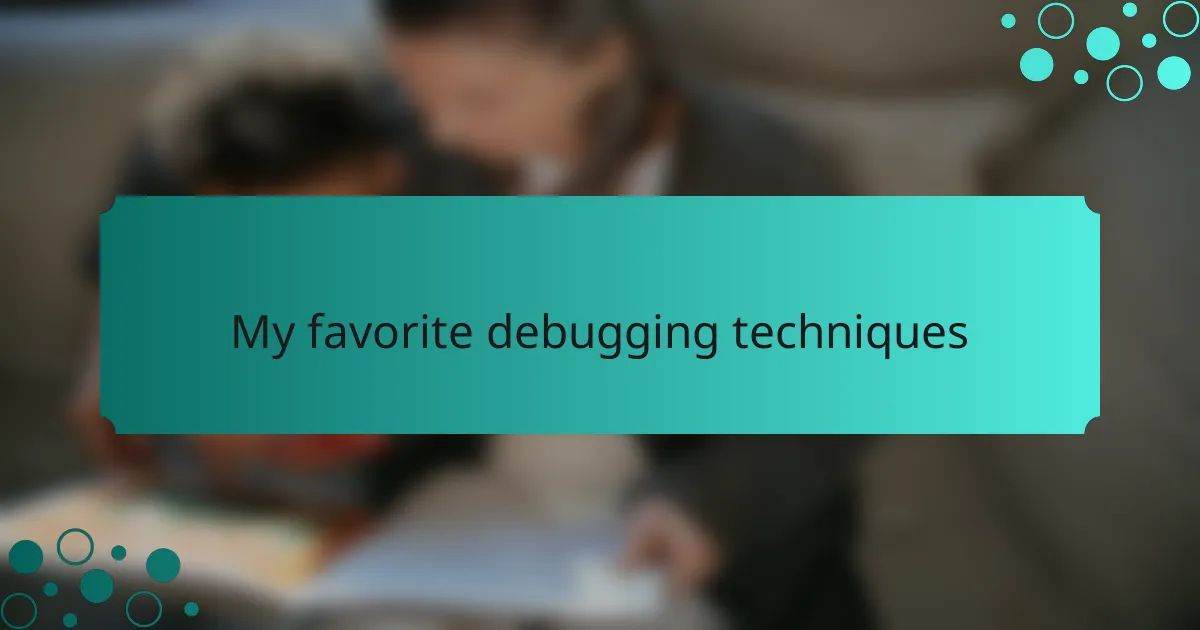
My favorite debugging techniques
Using breakpoints is one of my favorite debugging techniques. It’s almost like hitting pause on a movie to analyze a scene that doesn’t quite make sense. I vividly recall a moment where I set a breakpoint in a particularly gnarly piece of code and watched as the program’s flow unfolded. The clarity I gained in those moments was invaluable, turning a frustrating bug hunt into a fascinating exploration of my code.
Another technique that I rely on heavily is stepping through my code line by line. This approach has often illuminated hidden issues that I might not catch just by reading through the code. It’s like being a detective, piecing together clues that lead me to the crux of a problem. The first time I broke an elusive bug this way, I felt a rush of excitement—like solving a mystery where every tiny detail mattered.
Lastly, I can’t emphasize enough how useful it is to keep a debugging diary. Recording my thought process and lessons learned during each session has transformed my debugging approach. Reflecting on those notes not only improves my skills over time but also provides a comforting sense of progress. Have you ever looked back at old notes and realized just how far you’ve come? It’s a boost of motivation that I cherish.
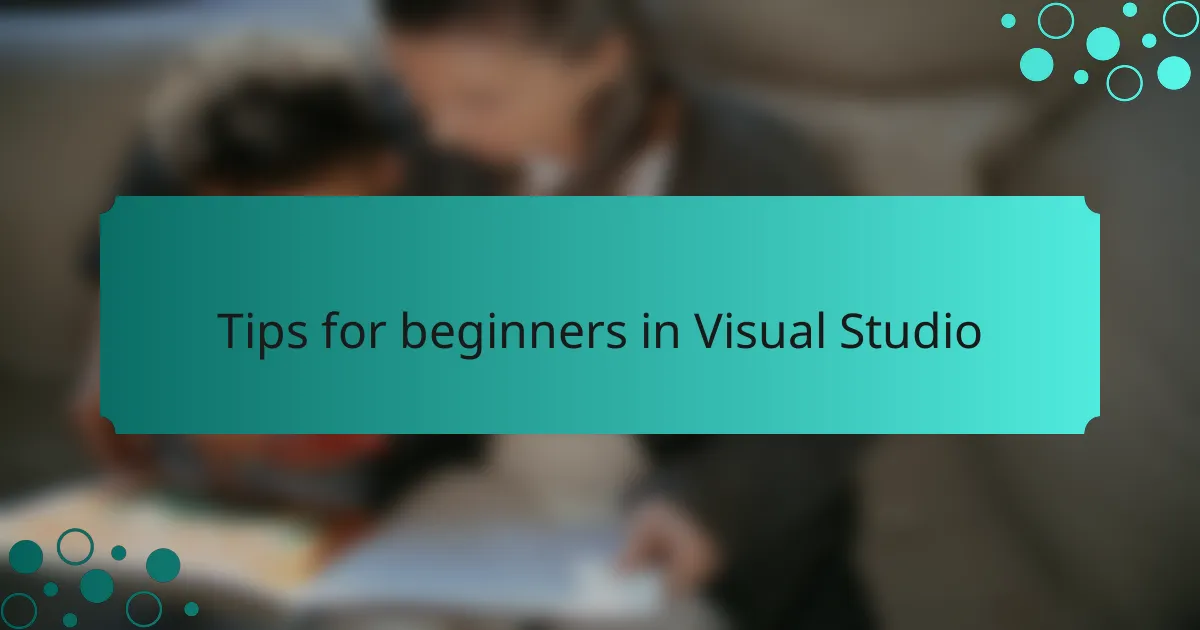
Tips for beginners in Visual Studio
When I first started using Visual Studio, I found its debugger to be both powerful and a bit overwhelming. However, the more I explored, the more I realized that mastering its debugging tools can profoundly enhance my coding journey. I still remember the first time I successfully tracked down a bug that had been eluding me for days—it felt like uncovering a hidden treasure.
To help beginners make the most of their debugging experience, here are some practical tips:
- Familiarize Yourself with Breakpoints: Set breakpoints in your code to pause execution and inspect variables.
- Use the Watch Window: Monitor the values of specific variables in real-time as you step through your code.
- Step Through Your Code: Take advantage of the ‘Step Over’ and ‘Step Into’ functions to follow the flow of your program closely.
- Leverage Exception Handling: Use try-catch blocks to gracefully handle unexpected errors and pinpoint their origins.
- Explore Debugging Configurations: Experiment with different debug configurations to see which best suits your workflow.
These simple strategies significantly improved my debugging efficiency, turning what once felt like a daunting task into a more manageable and even enjoyable part of coding.
